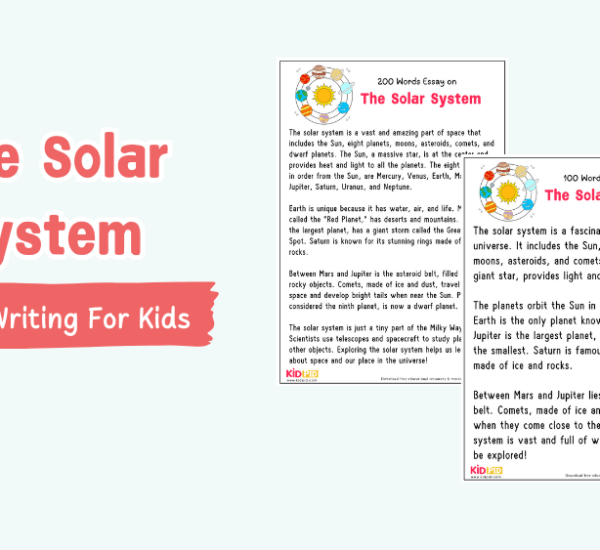Vaccines are powerful tools that protect us from dangerous diseases by strengthening our immune system. They have saved millions of lives and continue to play a vital role in public health, ensuring safer, healthier communities for everyone worldwide.
Contents
10 Pointers About Vaccines

- Vaccines protect you from dangerous diseases.
- They help your body fight germs like viruses and bacteria.
- Vaccines are safe and tested by scientists.
- Getting vaccinated keeps you and others healthy.
- Some diseases, like polio, are rare because of vaccines.
- You might feel a small pinch, but it’s quick!
- Vaccines prevent outbreaks in schools and communities.
- Some vaccines need booster shots for full protection.
- Herd immunity protects those who can’t get vaccinated.
- Doctors and parents choose vaccines to keep kids safe.
Short Essay On Vaccines
Essay On Vaccines in 100 Words

Vaccines are like superhero shields for your body! They protect you from harmful germs that can make you very sick. Doctors give vaccines as small shots, which may pinch for a second, but they keep you safe. Vaccines teach your body how to fight diseases like measles, flu, and polio. Because of vaccines, many dangerous illnesses are now rare. When most people get vaccinated, it also protects those who can’t, like babies or sick friends. Scientists test vaccines carefully to make sure they are safe. By getting vaccinated, you stay healthy and help others stay healthy, too!
Essay On Vaccines in 200 Words

Vaccines are one of the best ways to stay healthy and avoid dangerous diseases. They work by training your immune system to recognize and fight germs like viruses and bacteria. When you get a vaccine, it contains a tiny, harmless piece of the germ or a weakened version of it. Your body learns to attack it, so if the real germ ever enters your body, you’re ready to defend yourself!
Many diseases, such as smallpox and polio, used to harm thousands of children, but vaccines have made them rare today. Some vaccines, like the flu shot, are needed every year, while others protect you for life. Getting vaccinated doesn’t just help you—it also protects people around you, especially those who can’t get vaccinated due to allergies or illnesses.
Doctors and scientists spend years testing vaccines to make sure they are safe and effective. While a shot might hurt for a moment, the protection lasts much longer. Vaccines are an important part of going to school, playing with friends, and staying strong. By getting vaccinated, you’re being a health hero for yourself and your community!
Essay On Vaccines in 300 Words
Vaccines are like training sessions for your body’s defense system—the immune system. They prepare your body to fight serious diseases without you getting sick. When you get a vaccine, it contains a tiny, harmless part of a germ or a weakened version of it. Your immune system learns to recognize these germs and makes antibodies, which are like soldiers that fight infections.
Before vaccines, many children suffered from diseases like measles, mumps, and whooping cough. Some illnesses, like smallpox, were so deadly that they caused huge outbreaks. Thanks to vaccines, smallpox has been completely wiped out, and others, like polio, are very rare. Vaccines don’t just protect you—they also create “herd immunity,” which means if enough people are vaccinated, the disease can’t spread easily, protecting babies and people with weak immune systems.
Some vaccines, like the ones for tetanus or HPV, provide long-term protection, while others, like the flu vaccine, are needed every year because the virus changes. Scientists carefully test vaccines to make sure they are safe before giving them to kids. Sometimes, you might feel a little soreness or a mild fever after a shot, but that’s just your body building protection.
Getting vaccinated is a simple way to stay healthy and keep others safe, too. Schools often require vaccines because they prevent outbreaks. By getting your shots on time, you’re not just protecting yourself—you’re helping your whole community stay strong and healthy. Vaccines are a powerful tool that keeps everyone, including future generations, safe from dangerous diseases!
Long Essay On Vaccines in 500 Words
Introduction
Vaccines are one of the most significant advancements in medical science, saving millions of lives each year. They work by stimulating the immune system to recognize and combat pathogens like viruses and bacteria. Through vaccination, diseases such as smallpox have been eradicated, while others, like polio, are on the verge of elimination. Vaccines not only protect individuals but also contribute to herd immunity, reducing the spread of infectious diseases in communities.
How Vaccines Work
Vaccines contain weakened or inactive parts of a pathogen, or genetic material that triggers an immune response. When administered, the body produces antibodies to fight the infection. If the person is later exposed to the actual disease, their immune system recognizes and attacks it quickly. Some vaccines require booster shots to maintain immunity, while others provide lifelong protection.
Types of Vaccines
There are several types of vaccines, including live-attenuated (e.g., measles, mumps), inactivated (e.g., polio, flu), subunit (e.g., HPV), and mRNA vaccines (e.g., COVID-19). Each type is designed based on the pathogen’s nature and the best way to induce immunity. Advances in biotechnology have led to more effective and safer vaccines.
Benefits of Vaccination
Vaccination prevents serious illnesses, hospitalizations, and deaths. It also reduces healthcare costs by avoiding expensive treatments for preventable diseases. Additionally, vaccines protect vulnerable populations, such as infants, elderly individuals, and those with weakened immune systems, who cannot be vaccinated.
Common Misconceptions
Despite their benefits, some people hesitate to vaccinate due to misinformation. Myths, such as vaccines causing autism or containing harmful ingredients, have been debunked by scientific research. The safety of vaccines is rigorously tested in clinical trials before approval, and side effects are usually mild, such as soreness or mild fever.
Conclusion
Vaccines are a cornerstone of public health, preventing outbreaks and saving lives. Continued research and public awareness are essential to combat vaccine hesitancy and ensure global immunization coverage. By trusting science and getting vaccinated, individuals contribute to a healthier society.
FAQs on Vaccines
Q1. What is the main purpose of vaccines?
Ans. To protect the body from harmful diseases.
Q2. How do vaccines help your immune system?
Ans. They teach it to recognize and fight germs.
Q3. What are some diseases that vaccines can prevent?
Ans. Measles, polio, flu, and smallpox.
Q4. What happens when many people are vaccinated?
Ans. Herd immunity protects the whole community.
Q5. Why do some vaccines require booster shots?
Ans. To maintain long-term protection.
Q6. Name two types of vaccines.
Ans. Live-attenuated and mRNA vaccines.
Q7. Why is the flu vaccine needed every year?
Ans. Because the flu virus changes often.
Q8. What are the common side effects of vaccines?
Ans. Soreness and mild fever.
Q9. What is a myth about vaccines that is not true?
Ans. That vaccines cause autism.
Q10. Why is vaccination important for society?
Ans. It prevents disease outbreaks and protects everyone.
Vaccines protect us from dangerous diseases, save lives, and keep communities healthy. They are safe, effective, and essential for a better future, making immunization a responsibility for everyone. For more, visit our website and get more paragraphs, essays, worksheets, flashcards, Quizzes, and other interactive resources. Make sure to follow us on YouTube & Facebook.
You might also like

Born into slavery around 1822, Harriet Tubman escaped in 1849 and courageously led many others to freedom via the Underground Railroad. A “Moses,” she served as nurse, spy, cook, and activist.

Beyoncé Giselle Knowles-Carter, born September 4, 1981, in Houston, rose from Destiny’s Child to solo superstardom with hits like “Crazy in Love.” Actress, entrepreneur (Ivy Park), philanthropist, and powerful advocate for women.

Born Samuel Clemens in 1835 in Missouri, Mark Twain, named for safe river depths, wrote classic adventures like Tom Sawyer and Huckleberry Finn, blending humor and social insight inspired by the Mississippi River.

Born in Scotland in 1838, John Muir became America’s ‘Father of the National Parks,’ co-founded the Sierra Club, championed Yosemite’s preservation, and inspired conservation through his writings and lifelong passion for nature.

Barack Hussein Obama II (born August 4, 1961, Hawaii) became the 44th U.S. President (2009–2017), the first African American leader, passed the Affordable Care Act, and won the 2009 Nobel Peace Prize.






